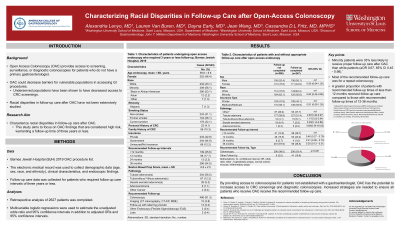Monday Poster Session
Category: Colorectal Cancer Prevention
P1750 - Characterizing Racial Disparities in Follow-Up Care After Open Access Colonoscopy
Monday, October 23, 2023
10:30 AM - 4:15 PM PT
Location: Exhibit Hall

Has Audio

Alexandria Lenyo, MD
Vanderbilt University
Nashville, TN
Presenting Author(s)
Alexandria Lenyo, MD1, Lauren Van Buren, MD2, Dayna Early, MD2, Jean Wang, MD, PhD2, Cassandra D.L. Fritz, MD, MPHS2
1Vanderbilt University, Nashville, TN; 2Washington University in St. Louis, St. Louis, MO
Introduction: Open access colonoscopy (OAC) provides screening and diagnostic colonoscopies for those who are not office-established patients of a gastroenterologist. OAC has the potential to increase access to screening and surveillance, improving health equity. Non-attendance to open access endoscopies has been previously studied, but racial disparities in follow-up care after OAC has not been fully described.
Methods: We conducted a retrospective chart review of all OAC completed in 2019 at Barnes-Jewish Hospital (BJH), a large nonprofit hospital in St. Louis, MO. Demographic variables, personal and family history of colorectal cancer (CRC), Boston Bowel Prep Score (BBPS), endoscopic findings, pathology, and follow-up recommendations were recorded. Data was collected on follow-up care for patients who were recommended short follow-up intervals (≤ 3 years). Multivariable logistic regressions were used to estimate adjusted odds ratios (ORs) and 95% confidence intervals (CI).
Results: Of the 2627 patients scheduled for OAC in 2019, 543 (20.7%) patients received a follow-up recommendation of ≤ 3 years. The average age was 59.8 +/- 8.6 years. 252 (46%) were female, 234 (43.1%) self-identified as white, 309 (56.7%) identified as a racial minority, and 93.9% (290/309) of the minority patients identified as Black. Most (78.1%) patients had an adequate BBPS score (≥ 6). Only 45.5% (247/543) received the recommended follow-up care. 22.3% (121/543) of patients were given a ≤ 3-month follow-up interval, while 54.5% (296/543) were asked to repeat endoscopy at 3 years. Most patients (63.5%) had tubular adenomas, while only 27 (5%) had tubulovillous adenomas, 26 (4.8%) serrated lesions, and 6 patients (1.1%) had adenocarcinoma. Patients identifying as white were more likely to receive the recommended follow-up care than those identifying as a minority (52.1% vs 40.5%, p=0.007). Minority patients were found to be 38% less likely to receive the appropriate follow-up for any recommendation that was ≤ 3 years (controlling for BBPS, insurance type, age, pathology, family and personal history of CRC, and smoking history; OR = 0.62 95% CI 0.43 to 0.88).
Discussion: Minority patients undergoing OAC were less likely to receive the recommended follow-up colonoscopy after receiving a short follow-up interval (≤ 3 years). Although OAC has the potential to increase access to colonoscopies for patients and decrease disparities in CRC screening, including strategies for follow-up after OAC is critical.
Disclosures:
Alexandria Lenyo, MD1, Lauren Van Buren, MD2, Dayna Early, MD2, Jean Wang, MD, PhD2, Cassandra D.L. Fritz, MD, MPHS2. P1750 - Characterizing Racial Disparities in Follow-Up Care After Open Access Colonoscopy, ACG 2023 Annual Scientific Meeting Abstracts. Vancouver, BC, Canada: American College of Gastroenterology.
1Vanderbilt University, Nashville, TN; 2Washington University in St. Louis, St. Louis, MO
Introduction: Open access colonoscopy (OAC) provides screening and diagnostic colonoscopies for those who are not office-established patients of a gastroenterologist. OAC has the potential to increase access to screening and surveillance, improving health equity. Non-attendance to open access endoscopies has been previously studied, but racial disparities in follow-up care after OAC has not been fully described.
Methods: We conducted a retrospective chart review of all OAC completed in 2019 at Barnes-Jewish Hospital (BJH), a large nonprofit hospital in St. Louis, MO. Demographic variables, personal and family history of colorectal cancer (CRC), Boston Bowel Prep Score (BBPS), endoscopic findings, pathology, and follow-up recommendations were recorded. Data was collected on follow-up care for patients who were recommended short follow-up intervals (≤ 3 years). Multivariable logistic regressions were used to estimate adjusted odds ratios (ORs) and 95% confidence intervals (CI).
Results: Of the 2627 patients scheduled for OAC in 2019, 543 (20.7%) patients received a follow-up recommendation of ≤ 3 years. The average age was 59.8 +/- 8.6 years. 252 (46%) were female, 234 (43.1%) self-identified as white, 309 (56.7%) identified as a racial minority, and 93.9% (290/309) of the minority patients identified as Black. Most (78.1%) patients had an adequate BBPS score (≥ 6). Only 45.5% (247/543) received the recommended follow-up care. 22.3% (121/543) of patients were given a ≤ 3-month follow-up interval, while 54.5% (296/543) were asked to repeat endoscopy at 3 years. Most patients (63.5%) had tubular adenomas, while only 27 (5%) had tubulovillous adenomas, 26 (4.8%) serrated lesions, and 6 patients (1.1%) had adenocarcinoma. Patients identifying as white were more likely to receive the recommended follow-up care than those identifying as a minority (52.1% vs 40.5%, p=0.007). Minority patients were found to be 38% less likely to receive the appropriate follow-up for any recommendation that was ≤ 3 years (controlling for BBPS, insurance type, age, pathology, family and personal history of CRC, and smoking history; OR = 0.62 95% CI 0.43 to 0.88).
Discussion: Minority patients undergoing OAC were less likely to receive the recommended follow-up colonoscopy after receiving a short follow-up interval (≤ 3 years). Although OAC has the potential to increase access to colonoscopies for patients and decrease disparities in CRC screening, including strategies for follow-up after OAC is critical.
Disclosures:
Alexandria Lenyo: Abbott Laboratories – Stock-publicly held company(excluding mutual/index funds). AbbVie – Stock-publicly held company(excluding mutual/index funds).
Lauren Van Buren indicated no relevant financial relationships.
Dayna Early indicated no relevant financial relationships.
Jean Wang indicated no relevant financial relationships.
Cassandra D.L. Fritz indicated no relevant financial relationships.
Alexandria Lenyo, MD1, Lauren Van Buren, MD2, Dayna Early, MD2, Jean Wang, MD, PhD2, Cassandra D.L. Fritz, MD, MPHS2. P1750 - Characterizing Racial Disparities in Follow-Up Care After Open Access Colonoscopy, ACG 2023 Annual Scientific Meeting Abstracts. Vancouver, BC, Canada: American College of Gastroenterology.

